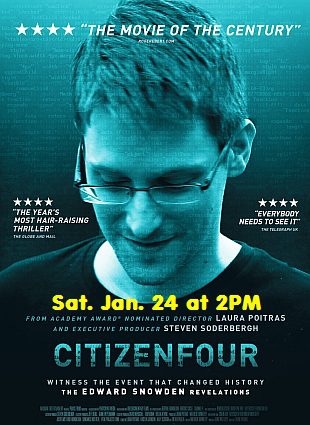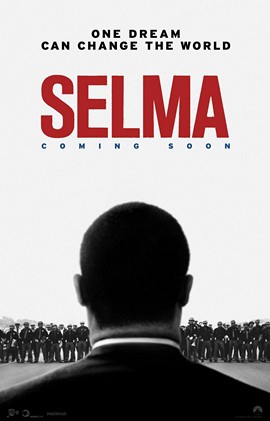lundi, 16 février 2015
Celluloid Heroism and Manufactured Stupidity in the Age of Empire
From Citizenfour and Selma to American Sniper
Celluloid Heroism and Manufactured Stupidity in the Age of Empire
by HENRY A. GIROUX
Ex: http://www.counterpunch.org

America’s addiction to violence is partly evident in the heroes it chooses to glorify. Within the last month three films appeared that offer role models to young people while legitimating particular notions of civic courage, patriotism, and a broader understanding of injustice. Citizenfour is a deeply moving film about whistleblower Edward Snowden and his admirable willingness to sacrifice his life in order to reveal the dangerous workings of an authoritarian surveillance state. It also points to the role of journalists working in the alternative media who refuse to become embedded within the safe parameters of established powers and the death-dealing war-surveillance machine it legitimates.
Snowden comes across as a remarkable young man who shines like a bright meteor racing across the darkness. Truly, the best of what America has to offer given his selflessness, moral integrity, and fierce commitment not only to renounce injustice but to do something about it. Selma offers an acute and much needed exercise in pubic memory offering a piece of history into the civil rights movement that not only reveals the moral and civic courage of Martin Luther King Jr. in his fight against racism but the courage and deep ethical and political americas-ed-deficit-300x449commitments of a range of incredibly brave men and women unwilling to live in a racist society and willing to put their bodies against the death dealing machine of racism in order to bring it to a halt. Selma reveals a racist poison at the heart of American history and offers up not only a much needed form of moral witnessing, but also a politics that serves as a counterpoint to the weak and compromising model of racial politics offered by the Obama administration.
The third film to hit American theaters at about the same time as the other two is American Sniper, a war film about a young man who serves as a model for a kind of unthinking patriotism and defense of an indefensible war. Even worse, Chris Kyle himself, the hero of the film, is a Navy Seal who at the end of four tours of duty in Iraq held the “honor” of killing more than 160 people. Out of that experience, he authored an autobiographical book that bears a problematic relationship to the film. For some critics, Kyle is a decent guy caught up in a war he was not prepared for, a war that strained his marriage and later became representative of a narrative only too familiar for many vets who suffered a great deal of anguish and mental stress as a result of their war time experiences. This is a made for CNN narrative that is only partly true.

A more realistic narrative and certainly one that has turned the film into a Hollywood blockbuster is that Kyle is portrayed as an unstoppable and unapologetic killing machine, a sniper who was proud of his exploits. Kyle models the American Empire at its worse. This is an empire steeped in extreme violence, willing to trample over any country in the name of the war on terrorism, and leaves in its path massive amounts of misery, suffering, dislocation, and hardship. Of the three films, Citizenfour and Selma invoke the courage of men and women who oppose the violence of the state in the interest of two different forms of lawlessness, one marked by a brutalizing racism and the other marked by a suffocating practice of surveillance.
American Sniper is a film that erases history, spectacularizes violence, and reduces war and its aftermath to cheap entertainment, with an under explained referent to the mental problems many vets live with when they return home from the war. In this case the aftermath of war becomes the main narrative, a diversionary tacit and story that erases any attempt to understand the lies, violence, corruption, and misdeeds that caused the war in the first place. Moreover, the film evokes sympathy not for its millions of victims but exclusively for those largely poor youth who have to carry the burden of war for the dishonest politicians who send them often into war zones that should never have existed in the first place. Amy Nelson at Slate gets it right in stating that “American Sniper convinces viewers that Chris Kyle is what heroism looks like: a great guy who shoots a lot of people and doesn’t think twice about it.” Citizenfour and Selma made little money, were largely ignored by the public, and all but disappeared except for some paltry acknowledgements by the film industry. American Sniper is the most successful grossing war film of all time.
 Selma will be mentioned in the history books but will not get the attention it really deserves for the relevance it should have for a new generation of youth. There will be no mention in the history books regarding the importance of Edward Snowden because his story not only instructs a larger public but indicts the myth of American democracy. Yet, American Sniper resembles a familiar narrative of false heroism and state violence for which thousands of pages will be written as part of history texts that will provide the pedagogical context for imposing on young people a mode of hyper-masculinity built on the false notion that violence is a sacred value and that war is an honorable ideal and the ultimate test of what it means to be a man. The stories a society tells about itself are a measure of how it values itself, the ideals of democracy, and its future.
Selma will be mentioned in the history books but will not get the attention it really deserves for the relevance it should have for a new generation of youth. There will be no mention in the history books regarding the importance of Edward Snowden because his story not only instructs a larger public but indicts the myth of American democracy. Yet, American Sniper resembles a familiar narrative of false heroism and state violence for which thousands of pages will be written as part of history texts that will provide the pedagogical context for imposing on young people a mode of hyper-masculinity built on the false notion that violence is a sacred value and that war is an honorable ideal and the ultimate test of what it means to be a man. The stories a society tells about itself are a measure of how it values itself, the ideals of democracy, and its future.
The stories that Hollywood tells represent a particularly powerful form of public pedagogy that is integral to how people imagine life, themselves, relations to others, and what it might mean to think otherwise in order to act otherwise. In this case, stories and the communal bonds that support them in their differences become integral to how people value life, social relations, and visions of the future. American Sniper tells a disturbing story codified as a disturbing truth and normalized through an entertainment industry that thrives on the spectacle of violence, one that is deeply indebted to the militarization of everyday life.
Courage in the morally paralyzing lexicon of a stupefied appeal to patriotism has become an extension of a gun culture both at home and abroad. This is a culture of hyped-up masculinity and cruelty that is symptomatic of a kind of mad violence and unchecked misery that is both a by-product of and sustains the fog of historical amnesia, militarism, and the death of democracy itself. Maybe the spectacular success of American Sniper over the other two films should not be surprising in a country in which the new normal for giving out honorary degrees and anointing a new generation of heroes goes to billionaires such as Bill Gates, Jamie Dimon, Oprah Winfrey, and other leaders of the corrupt institutions and bankrupt celebrity culture that now are driving the world into political, economic, and moral bankruptcy, made visible in the most profound vocabularies of stupidity and cruelty.
War machines and the financial elite now construct the stories that America tells about itself and in this delusional denial of social and moral responsibility monsters are born, paving the way for the new authoritarianism.
Henry A. Giroux currently holds the McMaster University Chair for Scholarship in the Public Interest in the English and Cultural Studies Department and a Distinguished Visiting Professorship at Ryerson University. His most recent books are America’s Education Deficit and the War on Youth (Monthly Review Press, 2013) and Neoliberalism’s War on Higher Education (Haymarket Press, 2014). His web site is www.henryagiroux.com.
00:05 Publié dans Cinéma, Film, Sociologie | Lien permanent | Commentaires (0) | Tags : cinéma, film, sociologie |  |
|  del.icio.us |
del.icio.us |  |
|  Digg |
Digg | ![]() Facebook
Facebook



Les commentaires sont fermés.